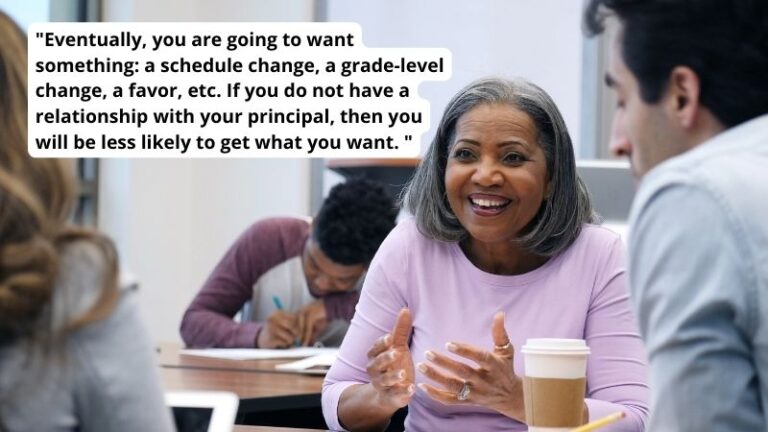Teacher Lindsay S. recently posted this tough question on our WeAreTeachers Helpline: “A student of mine came up to me this morning and wanted to tell me something privately—she overheard two teachers talking badly about me, during her class in one of the teacher’s classrooms… I don’t care about what they were saying because it’s just petty, but it’s definitely unprofessional to be doing it during class, especially when students can overhear what they’re saying. How would you handle this situation?”
Our teaching community weighed in with some helpful things to consider. Their answers spanned the spectrum from just letting it go to an absolute no-tolerance policy.
First, advice from the teachers who would turn the other cheek:
1. Ignore it.
Teacher Cris M. counsels, “Ignore it. There is nothing to gain by confronting it: don’t fuel the haters.” Live and learn, agrees Angel A. “Now you know, leave them be and grow a new crop of friends and colleagues.” Teaching is such a relational job, sometimes it is easy to forget that not everyone you work with is your friend. But you’ve got better things to do with your time, as Robin M. explains, “Nothing to handle. The important thing here is that you show your students that you are thick skinned and you just keep on working your job…they are your job, not other teachers.”
2. Take it with a grain of salt.
Rachel M. shares that she was recently involved in a similar experience- only on the other side of the situation—when a student thought she was the person generating the trash talk. “I would take what students say lightly,” she shares. “Perhaps what they overheard was misinterpreted—don’t jump to conclusions!” Debra J. concurs. “If I didn’t personally hear it, I would let it go. If it is happening, the teachers will eventually be caught.”
3. Turn it into a lesson for your students.
Sometimes difficult life circumstances provide us with the best opportunity to share our wisdom. Cris M. advises taking the high road. “Have a conversation with your students about how to confront someone who is talking about a friend behind their back,” she advises. Riley B. would use the situation as a lesson on reality. “I would use it as a teachable moment,” she says, “Not everyone returns the favor of being civil, so don’t expect it.”
But what if you just can’t let it go?
1. Document it.
“Pretend to ignore the incident, but document it,” advises Adrian G, “You never know when one day this may escalate into a serious workplace bullying situation.” Matt S. agrees. “It is hearsay, but it’s always a good idea to document, just in case. Wait and see if there is a pattern. I personally wouldn’t go to the administration unless I could prove it.”
2. Confront it head on.
“There is no problem with you addressing those teachers,” coaches Riley B. “Be strong and courageous and let them know that you would hope to see more professional behavior from your colleagues.” Tova R. recommends simply laying it out: “Honestly? I’d go up to them and say you were told what happened by a student, and if they could please keep their discussions about you out of earshot next time, that you’d appreciate it. You will gain respect by rising above it.”
3. Report it indirectly.
Let’s face it—not everyone is comfortable with confrontation. For teachers like Kirk H., who want to stay out of the situation directly but still want to make sure it is addressed, he advises encouraging the student to take it further, saying “I would somehow ask the student to report it to the principal.” Ann A. came up with a creative way to report trash talk indirectly by using a tool readily available in most schools. “We had an issue with this persisting over years—one department always gossiping about another,” she says, “Finally, on a climate survey, I wrote two detailed accounts—one from a student and one from a teacher, in hopes that it would get back to that department and end it. It did. It’s been years. Not a blip since.”
4. Skip the middleman.
Some teachers, like LeAnn R., prefer to go right to the top. “Don’t let it go. Report it, especially if the student is reliable.” Harmony M. felt just as passionately. “Wait a minute,” she says, “Two teachers having a private little chat DURING the lesson? About something irrelevant to that lesson? Totally unprofessional and demeaning to the students! I would definitely document it and talk with admin about the unprofessionalism.”
So there you have it teachers. Conflict is never easy to deal with but is a common occurrence in most workplaces. In the end how you deal with it depends on your personality as much as the situation. We’d love to hear what you think about the topic in the comments, so please weigh in!
Join our Facebook group WeAreTeachers—First Years! to connect with other new teachers, and learn more about how you can navigate your classroom and life.

